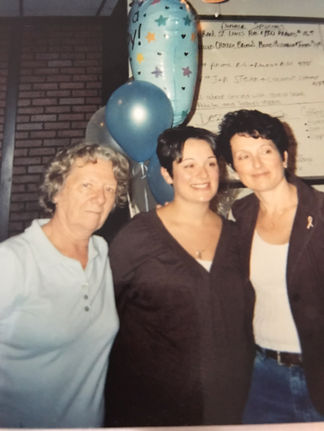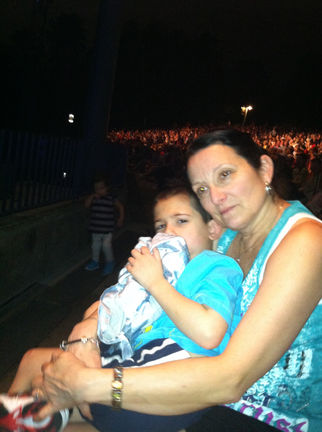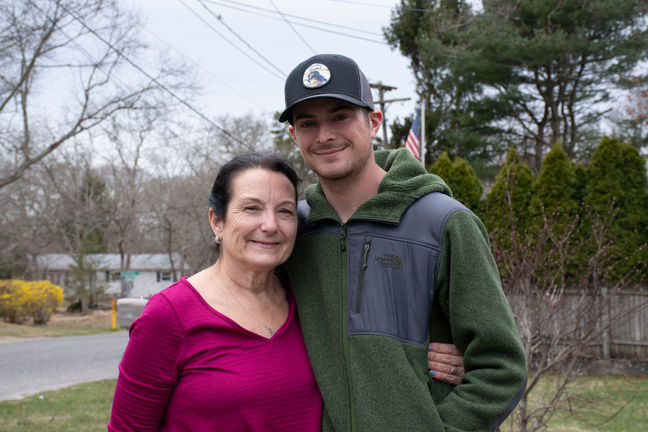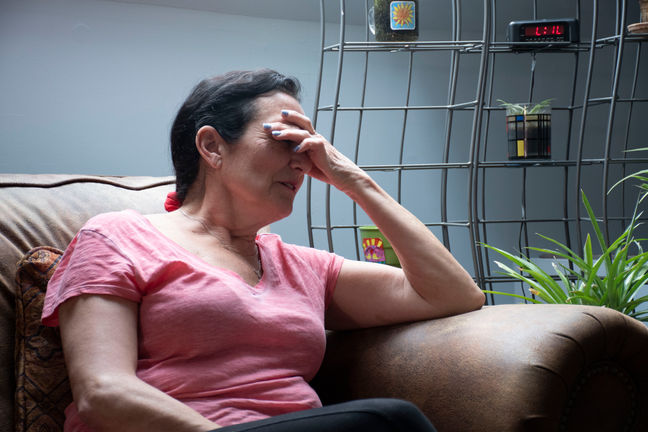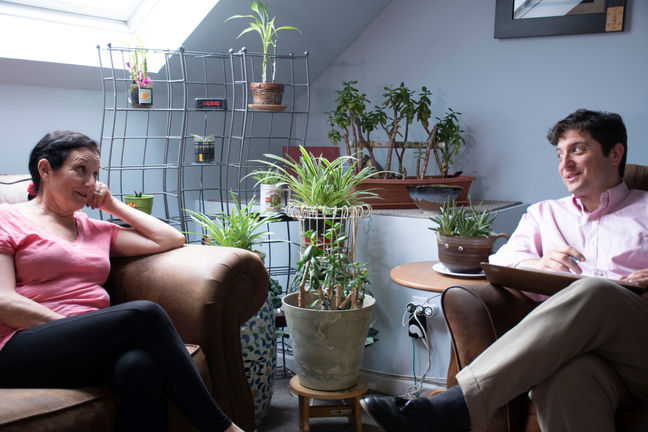Breast Cancer Doesn't Have To Own You
“You were diagnosed, but you don’t own it.” These words stuck with Debbie Sorrentino long after her doctor diagnosed her with breast cancer. To her, they mean that even though she was diagnosed with cancer, cancer doesn’t define her or her life.
Nor do the images in television advertisements aimed at women like her – patients and survivors of breast cancer.
Fight, strength and courage. These words get tossed around in commercials about breast cancer awareness, like the one the Cancer Treatment Centers of America released in 2017. The ad shows a woman running and playing outside with her son. Text on the screen reads “Fight Breast Cancer.” But what people don’t see behind that cancer survivor’s smile are fear, depression and loss. Every year there are commercials for breast cancer awareness that portray women happily going through treatments, but that is not the full truth. These women are experiencing something that is not only harming their physical health but also affecting their mental health.
“Nobody knows unless you go through it, how frighten it is. You lose your dignity” said Sorrentino, a former dietician at a psychiatric center who lives in Shirley, Long Island was diagnosed with breast cancer on July 3, 2006 at 51 years old.
Fatigue and hair loss are two of the best-known symptoms that women experience during treatment for breast cancer. But people don’t often talk about the psychological damage and stress that occur during the process. According to the American Psychological Association, the emotional side of breast cancer treatments can affect a women’s physical well-being. Some patients develop negative emotions that can cause them to stop doing things that are good for them, such as exercising. Instead, they start doing things that are bad for them, such as withdrawing from family and friends.
Dealing with breast cancer is a long, strenuous process from the time of diagnosis to surgery, chemotherapy and radiation to even after treatment ends. According to the World Health Organization, breast cancer is the most common cancer among women.
Sorrentino’s entire world flipped upside down after the night in July 2006 when she felt a burning sensation and discovered a lump in her breast. After getting tested and receiving a second opinion from other doctors, she learned that she had Stage 4 breast cancer.
“I was petrified,” Sorrentino said.
Sorrentino had the support of her husband, her sister and caring doctors as she went through eight chemotherapy sessions. But despite the support, she developed depression and anxiety. Her mental health became more unstable as she feared the possibility of cancer returning and losing her life, she said. She has been in complete remission for 13 years but that doesn’t mean she is cured.
One day in 2009, Sorrentino felt her anxiety spiraling out of control and checked herself into the psychiatric unit at Huntington Hospital. “I felt so embarrassed,” she said, because she had worked for Sagamore Children’s Psychiatric Center and thought she understood how to take care of her mental health. “How did I end up here?”
After 13 years of remission from her breast cancer, Sorrentino’s health – physical and mental – suffered another blow when she was diagnosed in 2016 with ovarian cancer and underwent surgery. Her depression deepened and she began to dream that her body was riddled with cancer. There were many sleepless nights.
Today, she is a two-time cancer survivor, but she still struggles.“I smile all the time, and thankful for being here [despite] having two times cancer, but it doesn’t take away the depression,” Sorrentino said.
The waves of sadness always confused her she said. She couldn’t explain or understand why she felt the way she did. “Everyone says, ‘Oh you’re 12 years clean, you should be comfortable,’ but you’re never comfortable,” she said, explaining that even though she was “clean” from cancer, in the back of her mind, she lives in fear every second of her life.
“Validation of their fears and discomforts is very important,” John Cottone, a clinical psychologist from Stony Brook Psychotherapy and Wellness who treated Sorrentino, said.
In a 2018 study, the National Cancer Institute found that breast cancer survivors have an increased risk of anxiety, depression and suicide. Research supports the importance of psychotherapy in meeting their needs. A 2015 review by the Cochrane Breast Cancer Group looked at 28 studies of psychological treatment, women with non-metastatic breast cancer.Women who received cognitive behavioural therapy showed important reductions in anxiety, depression and mood disturbance,” the study reported.
According to the American Psychological Association, “By teaching patients problem-solving strategies in a supportive environment, psychologists help women work through their grief, fear and other emotions."
His patients understand that he can’t cure their cancer, Cottone explained, but he can provide a space where they can speak emotionally. “They believe that feeling better psychologically and emotionally will help them to be more resilient in the face of debilitating treatments and to maintain the will to keep fighting,” he said.
Having emotional support during the process of treating cancer is important, but the aftercare and therapy, once medical treatment is finished, are also important. Sorrentino said she struggled with the sense that some close family members were pushing her away. She said that her daughter feared losing her mother and believed that detaching herself from Sorrentino emotionally would make Sorrentino’s eventual death easier to handle.
Her emotional state put a strain in her marriage. She directed her anger towards her husband, she said, and he would get frustrated because he believed that illness was behind them now and wanted her to snap out of her depression.
“I need that hug, I need that kiss, I need you to tell me ‘I love you,” Sorrentino said.
Cancer doesn’t affect only the person who has it. It affects everyone around the patient. It is important for physicians, family and friends to immediately recognize the signs of depression in a person with cancer so they help the patient seek treatment immediately.
Breast cancer patients may feel emotionally isolated because they believe that no one can understand exactly what they are experiencing. Cancer.Net, a cancer informational site, states that nearly 1 in 4 women with breast cancer experience post-traumatic stress disorder, or PTSD. This could lead to feelings of detachment from themselves and others, outbursts of anger, emotional numbness and more.
Supports groups that hospitals can provide or that patients and survivors can find on their own can help.
There are many support groups that survivors can get involved with. Northwell Health offers Path to Wellness, peer to peer support groups and many educational programs such as how to relieve stress. But support groups aren’t only open to survivors. Adelphi NY Statewide Breast Cancer Hotline hosts a caregiver support groups for family and friends who’s loved one is going through cancer. There are also services that cater to the LGBTQ community, so everyone no matter their race, religion, sexuality, or gender can receive support.
Cancer Care, one of the best-known cancer services that focus on patients’ mental health and provides support The purpose of these groups is for breast cancer survivors to have someone who is going or has gone through a similar traumatic experience. It is often hard for people to understand what a survivor is going through if they haven’t experienced it for themselves.
Social workers play a part in making sure breast cancer patients are okay during the whole process. “We do whatever needs to be done,” Sharon Lerman, a social worker from Northwell Health Cancer Institute, said. She explains that social workers try to meet with every patient at least once. Some may not have enough support from the family and friends, so they try to keep a close eye on those patients and provide help in any way they can, including psychological help.
There are many kinds of supports group that hospitals can provide or survivors can find on their own. The purpose of these groups is for breast cancer survivors to have someone who is going or has gone through a similar traumatic experience as them. It is hard for people to understand what a survivor is going through if they haven’t experienced it for themselves.
Some researchers have found that support groups can increase survivors’ quality of life.
A 2018 study by the National Institute of Health described support groups as a place for “a safe exchange of experiences” where breast cancer patients and survivors can find “unconditional acceptance.” In the study, a group of women had formed a support group, and researchers came to the conclusion that the women in the group had “had better emotional functioning, body image, life perspectives and general quality of life as well as a lower tendency towards destructive coping strategies,” compared to a controlled group.
“[Adelphi has] a general program for women who are newly diagnosed up until 18 months, we have a support group for women under 40, we have a support group for women with metastatic breast cancer because our needs are very different than the general group,” Erin Nau, a social worker at Adelphi, said. Nau explains that support groups provide a service to women who feel alone and need a space to share their experience. She had seen some of the groups she has facilitated not wanting to leave even after their treatment is done, “and it turned into a book club, where we read books about breast cancer and compare that to their journey,” Nau said. There are even online forums for younger women diagnosed with breast cancer.
“A lot of people will explain that they are experiencing tunnel vision,” Alicia Italiano, a social worker from Stony Brook Cancer Center, said. “They’re in crisis mode, [so] any other issues that they’re experiencing in their life, they really can't handle it emotionally, so it kind of gets pushed to the side.”
Italiano explains that most breast cancer patients don’t have the time to process what they are going through, especially with all of the treatments, surgery and people cheering them on. It’s not until after the treatment ends that they are left to sit in their own thoughts of the changes that their body went through,with fewer people encouraging them on or checking in on them.
“It’s a lot of the process because they’re kind of leaving their old life behind, so they’re mourning the loss their old life,” Italiano said.
Younger women diagnosed with breast cancer definitely cannot be left out of the conversation when it comes to mental health. According to the Young Survival Coalition, even though a breast cancer diagnosis is rare among women younger than 35, there are over 250,000 women under the age of 40 living in the United States with breast cancer.
“Younger women tend to have more emotional distress,” Lerman added. “Many times, the younger women have a higher expectation for beauty than the older women because they're not as settled in their life.”
Younger women’s situations are different from those of older women. The mortality rate is higher for younger patients, and they face a higher risk of cancer recurrence. They may be dating and might feel more self conscious about their appearance or fear telling potential partners that they are ill. Also, treatments may cause some fertility issues. For all women, being uncomfortable with body image, especially after a mastectomy, can cause intimacy issues and can be psychologically damaging.
Mothers with breast cancer have a unique situation as well. They have to deal with explaining their difficult situation to their children and find childcare to help take care of their kids.
Lifetime had released a breast cancer awareness commercial in 2014 featuring actress, Heidi Klum. In the commercial, Klum talks about how 1 in 8 women are diagnosed with breast cancer and how to raise awareness to fund for a cure. But what about raising awareness of the mental stress that women already diagnosed face?
Leeann Medina-Martinez, a social worker with CancerCare, agrees that commercials tend to portray the physical struggle women face from breast cancer, but not so much of the distress behind closed doors. “When we hear ‘cancer,’ most of the time everybody focuses on physically something is happening in your body. But the mental health process of it is not really discussed,” Martinez said.
“[Mental health] is just not really put in the forefront in terms of the media,” she added. “They’re not really discussing it.”
Martinez argued that the media should explain more of what exactly it means to “battle” cancer, that the battle is not focused just on the treatment but also on the whole process, including receiving psychological help from support networks.
Some people believe that having a positive attitude and mindset while receiving treatment can help them cope through stress. Felicia Schneberg, a 64-year-old woman from Nassau County and a 19-year breast cancer survivor, said that focusing on positive thinking helped her.
“I’m a Holocaust survivor’s child, so my attitude was, ‘Pull up your bootstraps and get yourself in order,’” Schneberg said. In 2000, she was diagnosed with Stage 3 advanced breast cancer.
Schneberg said she stayed positive throughout her treatment. She said she understands women who cry at support groups, but she was always the person to tell people to stop crying, focus on their regimen and chemotherapy, and stay positive. “I’m not saying you can’t cry. Cry. But then stop. You gotta move on with your life and enjoy every minute of every day with your family and friends,” Schneberg said.
Schneberg says that she strongly believes that survivors can have a positive mental health experience she did, as long as they try to put themselves in a happy environment with positive people. “My mental health motto was, ‘If I can be positive, it makes the other people positive around me, which then makes me happy,” she said.
Breast cancer and mental health go hand in hand. Symptoms of depression, anxiety and PTSD are common among survivors. Trying to deal with the stress of life after treatment, such as going back to work or finding childcare, can be difficult for them without a strong support system.
Having cancer is more than just physically challenging. It is also mentally damaging. But positive thinking and talking through their emotions can help patients and survivors cope through such an exhausting process. Emotional pain can feel just as bad as physical pain. It’s not something that should be ignored or pushed to the side as less important than chemotherapy.
“Nobody knows, unless you go through it, how frightening it is,” Sorrentino says, “You lose your dignity.” But today, Sorrentino is working hard on her mental health. She visits Cottone’s office once a week for her depression and anxiety. But she is excited and looking forward to seeing her nephew, Justin, graduate from college this spring.
